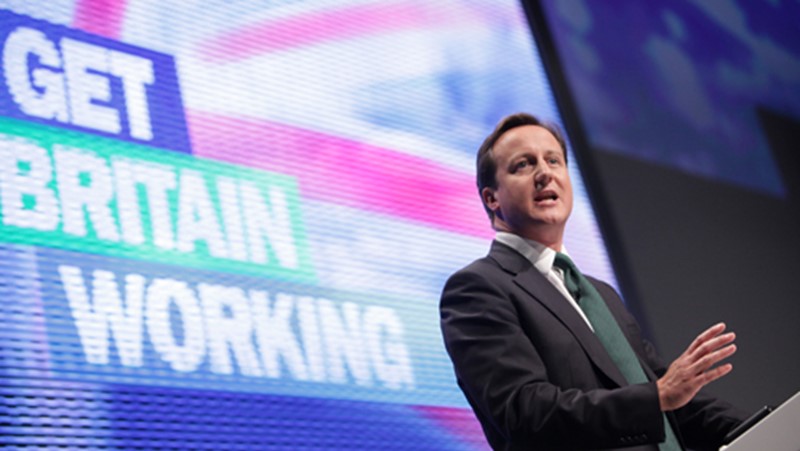
Squeezed between insurgent anti-Europeans, a skittish party and suspicious voters, Britain's prime minister promised a tough stance on the EU and tax cuts for millions in a bid to bolster support for his Conservative Party before a national election next year.
David Cameron closed the Conservatives' fall conference in the central English city of Birmingham Wednesday by arguing that four years of austerity under his government had restored Britain to economic health after the Great Recession.
He said that if re-elected he would reduce income taxes for middle-income earners and eliminate them for minimum-wage workers. At the same time, he said, his government would continue to cut public spending, trimming 25 billion pounds ($40 billion) in the two years after the election.
"We want to cut more of your taxes, but we can only do that if we keep on cutting the deficit," Cameron said. "This is common sense."
Polls suggest Cameron's Conservatives trail the Labour opposition before the election in May, though many voters see Cameron as a stronger leader than Labour's Ed Miliband.
The Conservatives have also lost supporters — and two lawmakers — to the populist U.K. Independence Party, which wants Britain to leave the European Union.
In a bid to defuse the UKIP challenge, Cameron vowed to wrest powers back from the EU before holding a national referendum on whether to quit the 28-nation bloc.
"I will go to Brussels. I will not take no for an answer," Cameron said.
Cameron, 47, was chosen as a modernizing leader in 2005 by a party floundering after its 1980s glory days under Prime Minister Margaret Thatcher. He was elected prime minister in 2010.
But his support for liberal causes such as gay marriage has left him mistrusted by traditionalists.
He appealed to small-c conservatives by promising to repeal the Human Rights Act introduced by a previous government, replacing it with a British bill of rights "rooted in our values."
He also sought to reassure undecided voters that his party was a good guardian of the National Health Service. Most Britons rely on the state-funded NHS, and the Tories are sensitive to Labour allegations that they will cut its funding or privatize it.
"For me, this is personal," said Cameron, whose severely disabled son Ivan died in 2009 at the age of 6.
In the most emotional passage of the speech, Cameron said he knew "what it is like when you go to hospital night after night with a sick child in your arms knowing that when you get there, there are people who will love that child and care for that child just as if it was their own."
"How dare they suggest I would ever put that at risk for other people's children?"
Cameron finished by warning that a vote for UKIP, led by Nigel Farage, could hand victory to Labour.
"On the 7th of May you could go to bed with Nigel Farage and wake up with Ed Miliband," Cameron said.


